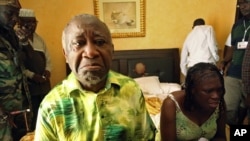ABIDJIAN —
Ivory Coast Justice Minister Gnenema Coulibaly said Monday that the country’s courts are capable of trying former First Lady Simone Gbagbo, who is wanted at the International Criminal Court (ICC) at The Hague, but said no official decision had been made on where her trial would take place.
Simone Gbagbo is wanted on four counts of crimes against humanity related to Ivory Coast’s 2010-11 post-election violence.
The conflict erupted after her husband, former President Laurent Gbagbo, refused to cede office after losing the November 2010 runoff vote to current President Alassane Ouattara. More than 3,000 people lost their lives and hundreds of thousands were displaced, according to United Nations estimates.
Laurent Gbagbo was transferred to The Hague soon after his arrest warrant was unsealed in November 2011, making him the first former head of state to be taken into the court’s custody. But the government has still not issued a formal response to Simone Gbagbo’s arrest warrant, which was unsealed five months ago.
Monday’s press conference was the first for Coulibaly since assuming the role of justice minister last November. He outlined a plan to create “a reformed and modern judiciary” by 2015. The plan includes improvements to detention conditions and some legal reforms.
But Coulibaly also said the judiciary had come a long way since the former president was transferred to the ICC, which is why the government may move to try Simone Gbagbo locally.
"The ICC can pursue suspects if the state does not have the willingness or the capacity to do it themselves, but the functioning of Ivory Coast's judiciary is at a very high level," he said, calling it "more interesting" to hold trial in Ivory Coast because the nation's courts want to show the aptitude of its magistrates.
Coulibaly assured that Gbagbo would benefit from a fair trial and the responded to allegations from a U.N. expert panel that President Ouattara’s military backers are making vast sums of money off of illegal smuggling of cocoa and other resources as well as extortion.
The claims were published in a report last Thursday that singled out former leaders of the New Forces rebel group who helped bring Ouattara to power during the 2010-11 post-election fighting and now occupy top security positions.
The report says these officials are engaged in “warlord-style predatory economic activities, which they have now extended to the entire Ivorian territory.”
Coulibaly said the government would not protect the suspects if the claims against them were proven true.
"They are open to these denunciations, that if the U.N. states there is proof against people implicated in trafficking, they need to receive this proof and undertake investigations," he said, adding that neither the president nor government cannot protect someone who steals, and if it is a military person has stolen, then he will appear before the military tribunal.
The expert panel called on the government to “immediately dismantle” the alleged criminal network.
Simone Gbagbo is wanted on four counts of crimes against humanity related to Ivory Coast’s 2010-11 post-election violence.
The conflict erupted after her husband, former President Laurent Gbagbo, refused to cede office after losing the November 2010 runoff vote to current President Alassane Ouattara. More than 3,000 people lost their lives and hundreds of thousands were displaced, according to United Nations estimates.
Laurent Gbagbo was transferred to The Hague soon after his arrest warrant was unsealed in November 2011, making him the first former head of state to be taken into the court’s custody. But the government has still not issued a formal response to Simone Gbagbo’s arrest warrant, which was unsealed five months ago.
Monday’s press conference was the first for Coulibaly since assuming the role of justice minister last November. He outlined a plan to create “a reformed and modern judiciary” by 2015. The plan includes improvements to detention conditions and some legal reforms.
But Coulibaly also said the judiciary had come a long way since the former president was transferred to the ICC, which is why the government may move to try Simone Gbagbo locally.
"The ICC can pursue suspects if the state does not have the willingness or the capacity to do it themselves, but the functioning of Ivory Coast's judiciary is at a very high level," he said, calling it "more interesting" to hold trial in Ivory Coast because the nation's courts want to show the aptitude of its magistrates.
Coulibaly assured that Gbagbo would benefit from a fair trial and the responded to allegations from a U.N. expert panel that President Ouattara’s military backers are making vast sums of money off of illegal smuggling of cocoa and other resources as well as extortion.
The claims were published in a report last Thursday that singled out former leaders of the New Forces rebel group who helped bring Ouattara to power during the 2010-11 post-election fighting and now occupy top security positions.
The report says these officials are engaged in “warlord-style predatory economic activities, which they have now extended to the entire Ivorian territory.”
Coulibaly said the government would not protect the suspects if the claims against them were proven true.
"They are open to these denunciations, that if the U.N. states there is proof against people implicated in trafficking, they need to receive this proof and undertake investigations," he said, adding that neither the president nor government cannot protect someone who steals, and if it is a military person has stolen, then he will appear before the military tribunal.
The expert panel called on the government to “immediately dismantle” the alleged criminal network.




